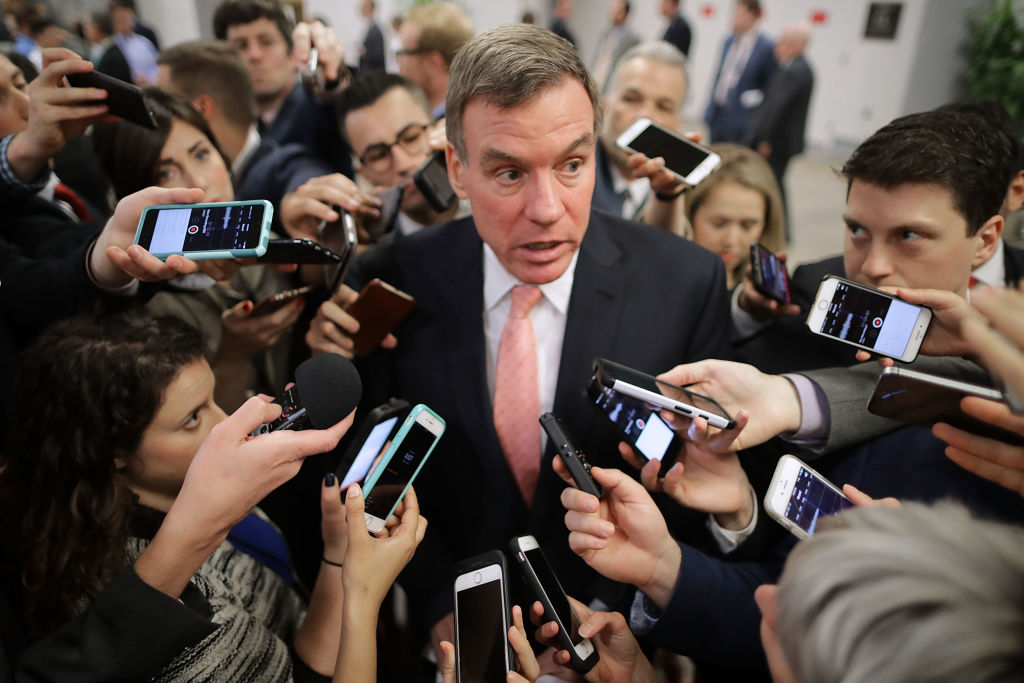Bipartisan Legislation Targets TikTok, Other Tech Companies Owned by ‘Adversarial Nations’
A bipartisan group of lawmakers is seeking to expand the federal government’s power in order to ban TikTok and other foreign-owned entities from operating in the United States. Sens. Mark Warner (D-Va.) and John Thune (R-S.D.) are co-sponsoring legislation that would increase the Commerce Department’s power to take action against tech companies that are owned by six adversarial foreign nations. “I think we all know that over the past several years foreign technology products from adversarial nations China, Russia, North Korea, Iran, Cuba, and Venezuela, have really tried to establish a foothold in American markets,” Warner said at a March 7 press briefing. “Today, everybody’s talking about TikTok and the ability of that platform to be used by the [Chinese] Communist Party (CCP) both to take on data but also potentially as a malign influence and propaganda tool.” Social media giant TikTok has long been flagged as a national security threat due to its connections to the CCP through parent company ByteDance. China-based ByteDance is subject to CCP laws that require companies to hand over all data to the regime upon request. The company is also known to have used TikTok data to illicitly stalk American journalists who wrote stories about the company’s relationship to the CCP regime. Warner said that federal efforts to take action against TikTok and other companies had been stymied by their inability to do much more than add companies to various trade bans. To that end, he said, the government needed a more comprehensive tool at its disposal. “These risks are not going away and, unfortunately, our tools to date have been relatively limited,” Warner said. “We need a more comprehensive approach to evaluate and mitigate these threats posed by these foreign technologies from these adversarial nations.” Likewise, Thune said that the lack of a “comprehensive process” to deal with such issues had left Congress playing “whack-a-mole” with numerous foreign companies including Huawei, ZTE, and now TikTok. The company’s apparent ties to the CCP, he said, presented too grave a threat that the regime might use TikTok to expand its campaign to spy on American citizens and sow disinformation and propaganda among U.S. audiences. “It is widely acknowledged that TikTok is a threat to our national security, which is why Congress took steps last year to ban the platform on government devices,” Thune said. “I’m particularly concerned about TikTok’s connections to the Chinese Communist Party which repeatedly spies on American citizens.” Thune said that, given the CCP’s malign influence and constant efforts to suppress the truth about its overseas espionage campaigns and even the origins of COVID-19, the government would need to take stronger action to prevent it from using TikTok to undermine the United States. “It’s safe to assume that if the CCP is willing to lie about its spy balloon and cover up the origins of the worst pandemic in 100 years, they’ll lie about using TikTok to spy on American citizens,” Thune said. “The Chinese Communist Party has proven over the last few years that it’s willing to lie about just about everything. That likely won’t end with TikTok, which is why it’s important to establish a holistic and methodical approach to the challenges posed by technology from foreign adversaries.”


A bipartisan group of lawmakers is seeking to expand the federal government’s power in order to ban TikTok and other foreign-owned entities from operating in the United States.
Sens. Mark Warner (D-Va.) and John Thune (R-S.D.) are co-sponsoring legislation that would increase the Commerce Department’s power to take action against tech companies that are owned by six adversarial foreign nations.
“I think we all know that over the past several years foreign technology products from adversarial nations China, Russia, North Korea, Iran, Cuba, and Venezuela, have really tried to establish a foothold in American markets,” Warner said at a March 7 press briefing.
“Today, everybody’s talking about TikTok and the ability of that platform to be used by the [Chinese] Communist Party (CCP) both to take on data but also potentially as a malign influence and propaganda tool.”
Social media giant TikTok has long been flagged as a national security threat due to its connections to the CCP through parent company ByteDance.
China-based ByteDance is subject to CCP laws that require companies to hand over all data to the regime upon request. The company is also known to have used TikTok data to illicitly stalk American journalists who wrote stories about the company’s relationship to the CCP regime.
Warner said that federal efforts to take action against TikTok and other companies had been stymied by their inability to do much more than add companies to various trade bans.
To that end, he said, the government needed a more comprehensive tool at its disposal.
“These risks are not going away and, unfortunately, our tools to date have been relatively limited,” Warner said.
“We need a more comprehensive approach to evaluate and mitigate these threats posed by these foreign technologies from these adversarial nations.”
Likewise, Thune said that the lack of a “comprehensive process” to deal with such issues had left Congress playing “whack-a-mole” with numerous foreign companies including Huawei, ZTE, and now TikTok.
The company’s apparent ties to the CCP, he said, presented too grave a threat that the regime might use TikTok to expand its campaign to spy on American citizens and sow disinformation and propaganda among U.S. audiences.
“It is widely acknowledged that TikTok is a threat to our national security, which is why Congress took steps last year to ban the platform on government devices,” Thune said.
“I’m particularly concerned about TikTok’s connections to the Chinese Communist Party which repeatedly spies on American citizens.”
Thune said that, given the CCP’s malign influence and constant efforts to suppress the truth about its overseas espionage campaigns and even the origins of COVID-19, the government would need to take stronger action to prevent it from using TikTok to undermine the United States.
“It’s safe to assume that if the CCP is willing to lie about its spy balloon and cover up the origins of the worst pandemic in 100 years, they’ll lie about using TikTok to spy on American citizens,” Thune said.
“The Chinese Communist Party has proven over the last few years that it’s willing to lie about just about everything. That likely won’t end with TikTok, which is why it’s important to establish a holistic and methodical approach to the challenges posed by technology from foreign adversaries.”












